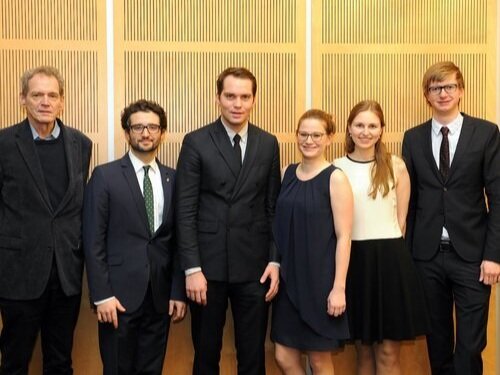Obermayer German Jewish History Award
Michael Heitz
Eppingen/Kraichgau, Baden Württemberg
When Michael Heitz was 15, he began knocking on doors in his hometown of Eppingen, asking people what they remembered about their former Jewish neighbors. "I got mostly closed doors," recalled Heitz.
As a high school student, Heitz entered a national German history competition about what happened in his community during the Third Reich. When he knocked on neighbors' doors to ask what they remembered about the jews of their town, many of them refused to talk. His best source and inspiration turned out to be his grandmother. He recalled, "It turned out she worked for a Jewish family in the 1920s. She had never shared it before with me. She said, 'Michael, we committed such a wrong. And I am ready to share this with you. We kicked out people who were living here.'" Heitz won a prize for his entry.
Heitz later earned a masters degree in education from the University of Education Heidelberg, with a thesis and a curriculum on "Jewish life in Kraichgau, based on the example of the former Palatinate town of Eppingen in the 19th and 20th century."
This was only the beginning. Today, the work Heitz began 30 years ago has helped secure the record of local Jewish history, build ties with former Jewish residents of Eppingen as well as the Kraichgau area, and set the stage for a whole new generation of pupils to create something positive while grappling with the past. Heitz has written numerous articles on local Jewish history and Jewish personalities, and has guided his students in creating a website, book and calendar dedicated to that history.
As founding president of Jüdisches Leben Kraichgau e.V., he is working toward creating a learning center about the former Jewish life and its cultural heritage in the Kraichgau area
in the former synagogue of Eppingen. The association already has established the Kraichgau Forest in Israel, under the auspices of the Jewish National Fund.
Heitz has carried out research for Yad Vashem, Israel's Holocaust Memorial, and joined the board of the interfaith Deutsch-Israelischen Gesellschaft (German-Israel Society) Rhein-Neckar/Mannheim .
"He makes this connection with our responsibility for German history… but he is also not sitting there. He says we have a responsibility to the Jews today," said retired local minister and educator Albrecht Lohrbächer, who in 1983 created a partnership and exchange program between his own town, Weinheim, and the Israeli town of Ramat Gan. "Now, Eppingen is preparing a partnership with [the town of] Zichron Yaakov," Lohrbächer, 67, said. "I would like to see more people like Mr. Heitz, working to see that Israel is perceived in another way."
Over the years, Heitz - now a teacher at the Albert-Schweitzer-Schule in Sinsheim - pieced together the history of Eppingen's Jews and built close contacts between several Jewish families in the U.S. and Israel, with roots in the town. "We phoned and wrote letters, and with this information I went to school and taught."
As a result, Heitz and his students created their website and award-winning book - published in 2006. "And then because of these students' work, the town of Eppingen invited the survivors to visit in 2002," Heitz said. "It was like a snowball effect." Heitz provided the Jewish visitors with information he had gleaned about their ancestors. He conducted videotaped interviews with Jews and non-Jews from the town and managed to have the town rename its high school after a former Jewish resident, Selma Rosenfeld (1892-1984), who settled in California. His documentary work "will be a lasting memorial not only for our generation, but for the future generations as well," wrote Kate W. Katz of Pennsylvania in her nomination.
"Bottom line, Michael Heitz is both the conscience and activist in the town of Eppingen," wrote Werner Frank of California, who - thanks in part to Heitz - overcame his reluctance to speak about the past. "In all [his] activities, Heitz modestly remains on the sideline, giving maximum exposure and credits to the youth that he so ably influences."
"My goal is that what happened here not be forgotten," said Heitz, who organizes an annual excursion to the former concentration camp, Ravensbrück. "But our focus is also to have a good relationship with the second and third generations, a good attitude towards Judaism and a constructive attitude towards Israel."
It all began that day 30 years ago, when 15-year-old Michael Heitz sat down to talk with his grandmother, after other doors were shut. She opened his eyes! "It was like a miracle… [how] everything came up, Heitz recalled.
And ever since, Heitz has been working as well "to open people's eyes.".
THIS WALL BRINGS PEOPLE TOGETHER
Students at this Berlin elementary school, built on the site of a synagogue, have been building a wall for the past two decades. It delivers a powerful message about community.
STUDENTS REACHING STUDENTS
When a handful of ninth graders from Berlin met Rolf Joseph in 2003, they were inspired by his harrowing tales of surviving the Holocaust. So inspired that they wrote a popular book about his life. Today the Joseph Group helps students educate each other on Jewish history.
“I SPEAK FOR THOSE WHO CANNOT SPEAK”
Margot Friedländer’s autobiography details her struggles as a Jew hiding in Berlin during World War II. Now 96, she speaks powerfully about the events that shaped her life and their relevance today.



